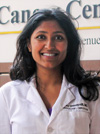Nov 22, 2010
|
November 2010: Finding the right mentor and developing a productive relationship with him or her can be a critical move for an early-career oncologist. Below, Jill Gilbert, MD, a 2009-2010 participant in the ASCO Leadership Development Program, and her mentee, Neeta Venepalli, MD, both of Vanderbilt University Medical Center, discuss the challenges and rewards of connecting with a mentor.
 |
The Mentee: Neeta Venepalli, MD
For most of us in fellowship, finding a good mentor can feel like an elaborate version of Where’s Waldo? combined with The Amazing Race. Fortunately, my program director encouraged us early on to establish an informal nexus of multiple mentors in both hematology and oncology while developing strong relationships with one or two primary mentors. This network has provided me a multitude of perspectives on career development and unique research collaborations. Rather than the sum total of hours spent with someone, I gauge my mentors’ influence by how I’ve internalized their professional values and skill sets. Along the way, I’ve learned that a great mentor has five unique qualities: accessibility, interest in furthering the fellow’s personal development, generosity with research ideas and authorship, critical honesty, and an instinct about when to guide their mentee towards other people and resources.
Being the beneficiary of a good mentor carries a certain burden of responsibility as well. As fellows, we are intimately acquainted with feeling overwhelmed, distracted, and insanely rushed; between personal and professional obligations, the easiest course of action is to go with the flow. It is tempting to latch on to one mentor and let her or him do the driving without much thought. However, overdependence on the mentor for career development or personal success limits the benefits of having a good mentor. It is also incumbent on us as fellows to build relationships with our mentors based on realistic expectations of their time and capabilities, and to understand when to move on after a relationship stops being mutually beneficial.
 |
The Mentor: Jill Gilbert, MD
As the Program Director of the Hematology/Oncology fellowship at Vanderbilt, I provide mentorship to several fellows. I may serve as the primary mentor for the fellow, or I may be a member of a “mentorship committee” for an individual. Either way, this relationship proves “sacred” and serves as one of the pillars of my academic life. While many faculty and community physicians serve as mentors, this should not be an obligatory responsibility of any individual as a successful mentor-mentee relationship requires a significant commitment on the part of the mentor. Just as all productive and successful adults are not suited to become parents, not all individuals are suited for the mentoring role, regardless of personal successes within their fields. But what in fact makes a good mentor? Answers to that question often fall under opinion and personal observation, rather than hard data. With that in mind, my own experience as a mentor (and a mentee) has allowed me to identify several tenets that prove critical to my mentor- mentee relationships. |
What makes a good mentor?
- Altruism/Generosity: This tenet cannot be overemphasized. The mentor must be secure enough in his or her own place in the professional “food chain” that the mentee is allowed to develop his or her own identity within the field and begin to take a leadership role in the shared work. This is the time for the mentee to become the first author on a manuscript, deliver an oral presentation, and develop a professional reputation that is related to, but separate from, that of the mentor. The mentor must be willing to place another individual’s needs before his or her own.
- Recognize the Mentee’s Individuality: The mentee’s career goals may not be identical to that of the mentor. For example, my mentee is a fabulous grants writer. She is able to write a scientific manuscript. However, she has discovered that she does not enjoy many of these activities as they relate to therapeutic clinical trials. Despite her talents, she does not want to be a clinical investigator. My role is to discuss her interests, help her find her passions within oncology, and guide her down a path that will allow her to meet her own interpretation of personal success, not my interpretation of success for her. I am committed to her success as she defines it.
- Time: Precious and limited, the time required to successfully mentor proves substantial and should be taken into account prior to entering the relationship. Even if the mentor is a Nobel Laureate, constantly traveling and furthering his or her own career leaves little time to devote to an individual who is in the formative stages of a career. See #1, Altruism/Generosity.
How do you build the relationship?
It’s critical that both individuals trust that each has the other’s best interests at heart. Moreover, transparency of the individual expectations and roles in the relationship remains important for building and maintaining this bond. What do you expect of the mentee? What do they expect from you? Can you trust each other? This discussion should happen at the initiation of the formal relationship. At Vanderbilt, we ask our mentors and mentees to fill out a mentorship agreement, which outlines these issues.
Like a marriage, the mentor-mentee relationship requires nurturing and work. However, the personal gratification can be phenomenal. We can all think of individuals who influenced us to go into oncology. Whether formal or informal relationships, these mentors had an impact on our professional lives, and we now represent the professional guides for a new generation.

Comments
Nirmal Lamichhane
Nov, 25 2010 5:12 AM
good ideas on the floor. It sometimes is awkard as it becomes a give and take relations and mentees expect much more than that can be given!!